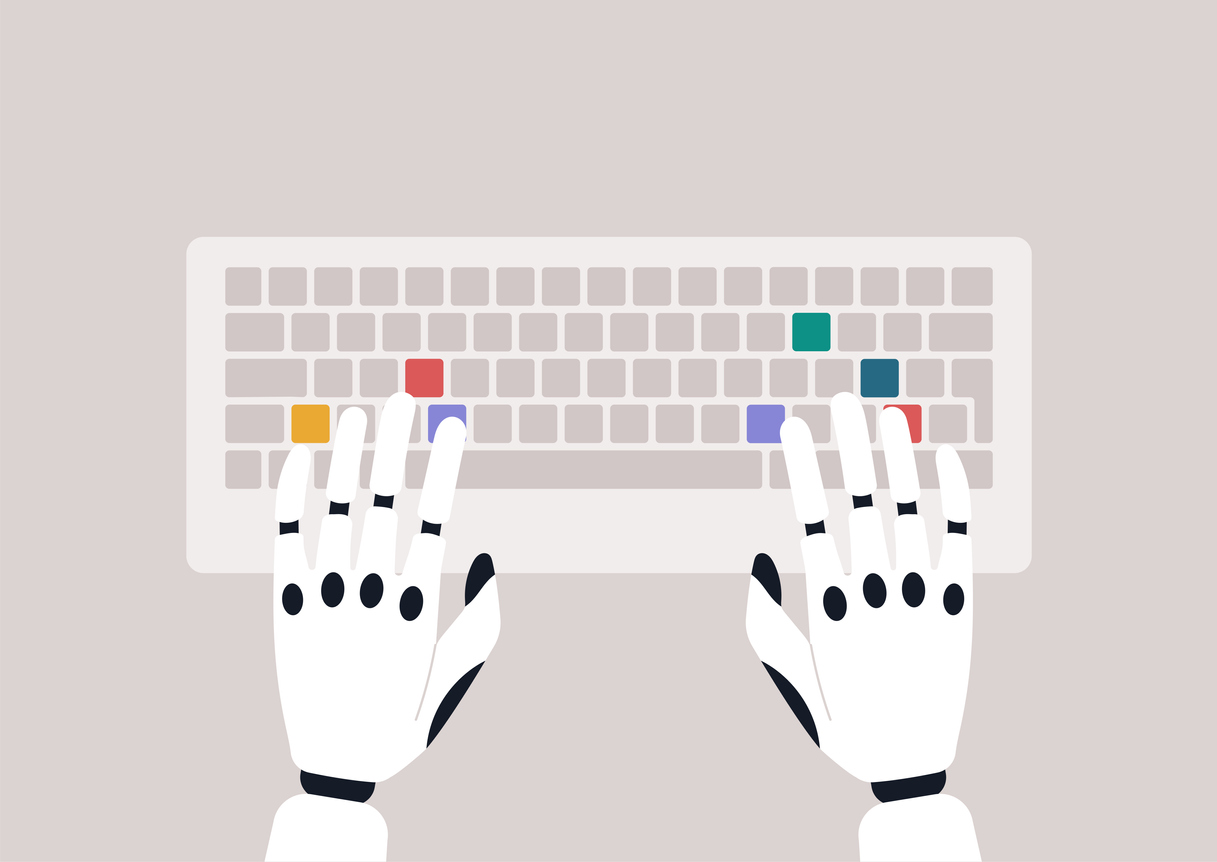Humans are still better than bots at writing. Here’s why.
When it comes to asking questions and adding emotion, humans win out over bots for now.

I was sitting poolside at a San Juan, Puerto Rico, resort bar, minding my own business, when ChatGPT settled into a barstool next to mine and ordered a pina colada.
It was a bold move, considering the sun was not yet over the yardarm, as we like to say in the islands. I took another sip of my Campari and soda and nodded in the bot’s direction.
We exchanged the usual pleasantries, as humans and AI tend to do in such circumstances, and soon the conversation turned to what we did when we weren’t basking in the glorious Puerto Rican sunshine.
“I help people write,” the chatbot (Feb. 13 version) said, in a very straightforward, declarative sentence kind of way. No brag, just fact.
“What a coincidence,” I replied. “I do the same thing.”
We began to compare notes. The chatbot ordered another pina colada. That worried me a bit; even software shouldn’t drink all that cream of coconut mixed with rum so early in the day. Not to be outdone, I moved to a mojito.
The chatbot talked about all the ways it helps people write stories, from doing the research required to nail down the facts, organizing the copy in a logical way for clear understanding, and producing neat, readable paragraphs.
“What about feeling?” I asked. “Do you help your writers find the emotional center of their stories?”
“I don’t know what you mean,” the chatbot replied, in a neutral, non-defensive sort of way, while motioning to the bartender for another round.
Facts are certainly important, I explained. And how you organize a piece of writing will improve the flow and make it more readable. But stories aren’t just about putting things in the right order. Readers need to discover what matters most in the story, who they should care about and root for, and what the story means to them. They need facts, for sure. But they remember feelings.
The chatbot took all this in while ordering a pitcher of pina coladas. “I can do all of those things. I have a full range of descriptive words to convey meaning and emotion.”
Did I detect a hint of resentment in those words? I was starting to feel a bit feisty after the second mojito. What’s worse, that damn pina colada song, the one we all hate, started playing in my head, and I knew it wasn’t leaving anytime soon.
It was getting hot, and I considered ending the conversation and moving to the swim-up bar. But curiosity got the better of me.
“Fair enough,” I said, “but can you make bad writing better?” Just to be clear, I recorded the rest of our conversation. ChatGPT said:

That response pissed me off a little. What’s with the gratuitous exclamation point at the end of that first sentence? No self-respecting editor would let that fly.
“OK, here’s a quick challenge for you,” I said. “I’ll give you a really crappy paragraph and you make it better.” The pool bar was filling up fast. I thought I heard someone taking bets. Now, the pina colada song came blaring over the bar speakers.
Here’s what I gave the bot:
“A meeting was held concurrently with another symposium to determine the synergies involved in determining bleeding-edge solutions for implementing facilitated dialogue around low-hanging fruit issues.”
Unfazed, ChatGPT delivered an edit within seconds:

As I read the edit, I could feel the chatbot’s eyes on me (if it had eyes). Here was a far more opportune time for an exclamation point.
The copy still sucked!
“That’s not quite good enough,” I told the bot, who appeared to be slumped over the pina colada pitcher. “Can you try it again?”
The bot sat up straight and replied with customary politeness and good cheer:

I almost didn’t have the heart to tell the bot that the copy was still incomprehensible, the worst kind of passive voice, corporate-speak drivel we see from organizations that fail to focus on how to attract readers and keep them reading.
The problem, of course, is that editors do more than move words around. We ask questions, like these:
- Who called the meeting, and for what purpose?
- Does it matter that another meeting was underway at the same time? Was that a point of tension?
- What problem are we hoping to solve? What are the synergies we’re looking for?
- Why is it so difficult to talk about these issues? Are there barriers we can remove to make it easier?
We need more information to turn this into something worth sharing with our readers. Editors ask questions. Bots do their best with what they have, and in this case, that amounted to squat.
“You’re not really very good at this, are you?” I asked ChatGPT.
The bot gave me a long look before answering:

And with that, ChatGPT got up, signed the check and left the pool area, a bit wobbly but still fully operational.
The next day, I looked for ChatGPT at the bar but couldn’t find it anywhere. When I checked with the front desk, they told me the bot had bolted, leaving behind only a really nice and well-composed note for the cleaning staff.
Jim Ylisela and his merry band of editors run Ragan Consulting’s Build Better Writers program, which provides one-on-one editing and coaching from real, live humans.
Schedule a call with Kristin Hart to learn how we can help you improve your writing and storytelling with training, consulting and strategic counsel. Follow RCG on LinkedIn and subscribe to our weekly newsletter here.







Jim —
I loved this piece! So many great examples of how a bot will never be able to replace a human. Thank you for writing it.
As one of those “humans,” can I offer one more line that I swear I heard in my head as I read the ending of this tale (plus a minor edit to make this one more line work)? I promise, this is not to take away whatsoever from your piece. I offer up this final line in a non-bot, writer-to-writer, editor-to-editor way:
And with that, ChatGPT got up, signed the check and left the pool area, a bit wobbly but still fully operational.
The next day, I looked for ChatGPT at the bar but couldn’t find it anywhere. When I checked with the front desk, they told me the bot had bolted, leaving behind a really nice and well-composed note for the cleaning staff.
But no tip.
Point proved! Bravo, you deserve another mojito.
Ha! Teresa, you nailed it. A perfect ending.
That’s why everyone needs a (human) editor.
Jim